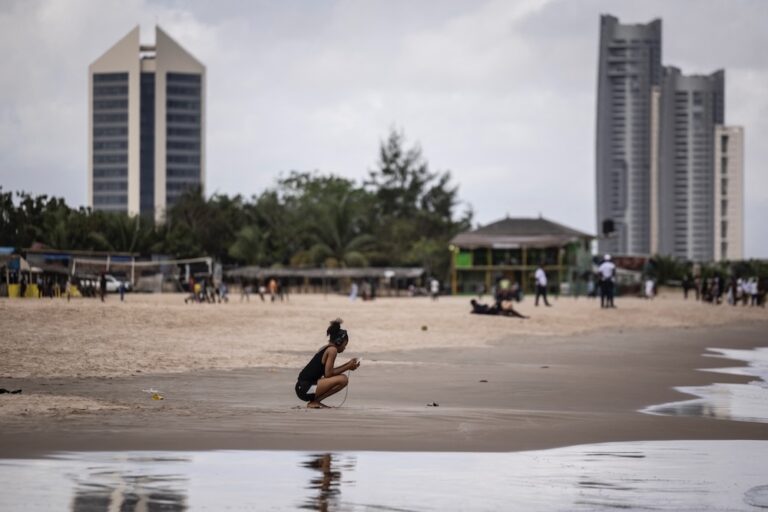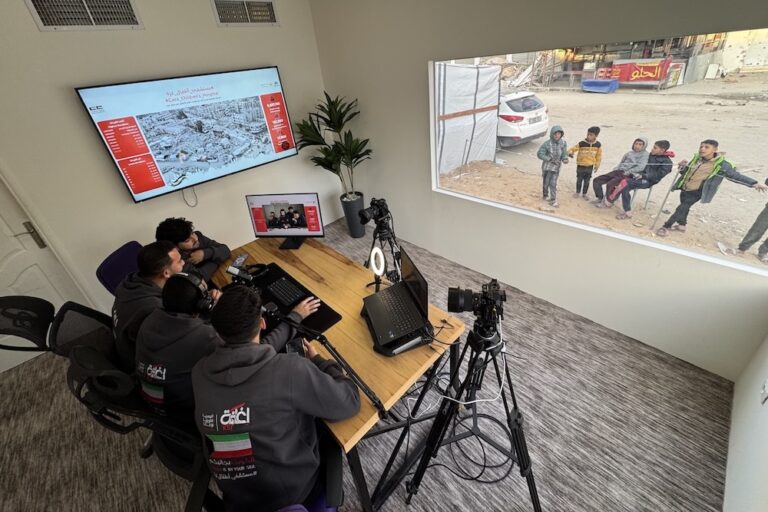Digital threats, spyware, and coercion by proxy means that - for millions of people around the world - transnational repression has become a common and institutionalised practice.
This statement was originally published on freedomhouse.org on 2 June 2022.
Two Belarusian activists are abducted from a Moscow hotel and driven over 400 miles to Minsk, where they are charged with planning a coup.
A Uyghur woman in Canada receives yet another phone call from Chinese police urging her to cooperate and threatening to detain her family members should she refuse.
A Russian man who fled to the United States after security services stole his business is held on a frivolous Interpol notice and kept in US immigration detention for a year and a half.
A Rwandan journalist applies for asylum in Mozambique and then disappears – possibly into the custody of Rwandan authorities.
Saudi officials asphyxiate and dismember an exiled Saudi journalist inside the country’s consulate in Istanbul.
All of these are examples of transnational repression, in which governments reach across national borders to silence dissent among diaspora and exile communities. They are real events that have occurred since 2014, illustrating an enormous and growing threat to activists, journalists, and migrants around the globe. Nondemocratic states are employing diverse and aggressive tactics to control their citizens, or sometimes even noncitizens, in every region of the world.
Freedom House is engaged in a multiyear study of transnational repression. Its latest report, Defending Democracy in Exile: Policy Responses to Transnational Repression, published in June 2022, examines what is being done to protect exiles and diaspora members who are being intimidated and attacked by the governments from which they fled. The report assesses the responses mounted by host governments, international organizations, and technology companies. It builds on the findings of Out of Sight, Not Out of Reach: The Global Scale and Scope of Transnational Repression – the first global study of this dangerous practice, which Freedom House released in February 2021.
The project draws on an original database of 735 direct, physical cases of transnational repression that took place between 2014 and 2021. In each incident, the origin country’s authorities physically reached an individual living abroad, whether through detention, assault, physical intimidation, unlawful deportation, rendition, or suspected assassination. Freedom House assembled cases of transnational repression from public sources, including UN and government documents, human rights reports, and credible news outlets, in order to generate a detailed picture of this global phenomenon. The database captures 36 origin states conducting physical transnational repression in 84 host countries. This total is certainly incomplete; hundreds of other physical cases that lacked sufficient documentation, especially detentions and unlawful deportations, are not included in Freedom House’s count. Nevertheless, even such a conservative tally shows that what often appear to be isolated incidents – an assassination here, a kidnapping there – actually represent a pernicious and pervasive threat to human freedom, democracy, sovereignty, and security.
Moreover, each case of physical transnational repression is only the tip of an iceberg. The chilling effect of every attack ripples out into the larger community. And beyond the physical cases compiled as part of this research are the much more widespread tactics of “everyday” transnational repression: digital threats, spyware, and coercion by proxy, such as the imprisonment of exiles’ families in the origin country. For millions of people around the world, transnational repression has become not an exceptional tool, but a common and institutionalized practice used by dozens of regimes to control people outside their borders.
Freedom House’s research shows that:
- Transnational repression is becoming a “normal” phenomenon as more governments around the world use it to silence dissent. More governments use transnational repression and do so far more frequently than is typically understood. In 2021, the governments of Belarus, Nigeria, Comoros, and Algeria were added to the database as perpetrators for the first time. The states that run transnational repression campaigns deploy a broad spectrum of tactics against their perceived enemies, from spyware and family intimidation to renditions or assassinations.
- Some attacks are unilateral, but most involve cooperation with or exploitation of host country institutions. The most common forms of physical transnational repression – detentions and unlawful deportations at the origin state’s request – entail co-optation of the host country’s institutions. Most renditions also involve close collaboration with host country authorities to illegally transfer people to the origin country. In some cases, foreign states manipulate institutions in democracies in order to reach their target, directly undermining the rule of law. More frequently, authoritarian governments willfully cooperate with one another in their pursuit of exiles and diaspora residents because they share an illiberal set of values. In 74 percent of the incidents of physical transnational repression that took place in 2021, both the origin and the host countries are rated Not Free in Freedom House’s annual Freedom in the World report.
- Countries that are home to exiles and diasporas lack the tools to respond to attacks by authoritarian governments. Governments that host targeted groups and individuals need to improve their security, migration, and foreign policies to ensure that they offer appropriate protection for the vulnerable and are capable of enforcing accountability for perpetrators.
- To facilitate transnational repression, nondemocratic governments work together to weaken universal human rights norms at international organizations. International organizations play a crucial role in documenting specific types of human rights violations stemming from the use of extraterritorial violence. However, in the absence of an agreed framework that identifies these violations as tactics of transnational repression, the efforts of international bodies remain ad hoc and disorganized. Some international forums are even the sites of transnational repression, as perpetrator states seek to exclude or punish activists who dare to participate or testify.
- The full spectrum of transnational repression tactics must be addressed. Online harassment, coercion by proxy, mobility controls, and use of spyware do not garner the same level of attention as assassinations, but these less visible forms of transnational repression are intimately connected to physical attacks. Host governments and technology companies are lagging in their responses to digital tactics of transnational repression. Any effective policy to combat transnational repression in general needs to address the entire array of tools used by perpetrators.
Freedom House’s first report on transnational repression, Out of Sight, Not Out of Reach, consisted of an introduction, a description of the methods of transnational repression, case studies on six states – China, Rwanda, Russia, Iran, Saudi Arabia, and Turkey – that have conducted significant transnational repression campaigns, and regional summaries covering countries not in the case studies.
The latest report, Defending Democracy in Exile, includes four essays that investigate new trends, describe best and worst practices among host country governments, explain the role of international organizations in confronting transnational repression, and demonstrate the importance of countering digital tactics. The report also features case studies on policy responses to transnational repression in nine important host countries: Canada, Germany, South Africa, Sweden, Thailand, Turkey, Ukraine, the United Kingdom, and the United States.
Freedom House’s recommendations focus on what governments, technology companies, and civil society organizations can do to hold perpetrators accountable for transnational repression, increase resilience within democracies, and better protect vulnerable individuals and groups. In addition to general recommendations for policymakers, there are specific recommendations for each of the nine host countries studied.
Governments can use security, migration, and foreign policy improvements to combat transnational repression. Consistent accountability, especially in the form of targeted sanctions, will raise the cost of transnational repression for the regimes in question. Resilience efforts, particularly measures that reduce opportunities for authoritarian states to manipulate institutions within democracies, will make it harder to attack exiles and diaspora communities in practice. Protection for vulnerable people, both when they face credible threats and more broadly by respecting the right to seek asylum, will prevent harm and enable them to exercise their fundamental rights, ultimately strengthening the foundations of democracy in both host and origin countries.
Transnational repression is a serious threat to human rights, democratic governance, and state sovereignty, as well as a disturbing manifestation of global authoritarianism. But with accountability for perpetrators and compassion for their targets, it can be stopped.
To read more about the project, click here. Data is available on request from Freedom House through research@freedomhouse.org. Please use the subject line “Transnational Repression Data Request.”



